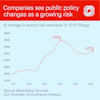Washington, D.C. – Public companies’ concerns about policy risks—like changes in taxes, regulations, and enforcement—have increased by 27% over the last decade, according to a new report from the U.S. Chamber of Commerce.
“The data show what business leaders tell us every day—rising public policy risks threaten business growth and innovation and our country’s global competitiveness,” said Suzanne P. Clark, President and CEO of the U.S. Chamber of Commerce. “In Washington, the polarization, gridlock, regulatory overreach, and inability to act smartly and strategically for our future are making it harder for businesses to do their jobs and move this country forward.”
The study analyzed how many times S&P 500 companies referenced terms commonly associated with public policy risk in their 10-K filings with the SEC from 2011 to 2021, finding that policy risk mentions dramatically increased over the last decade as compared with other risks, which were relatively flat.
The terms that saw the greatest percent increase in mentions were: “data privacy,” “immigration issues,” “labor” and “intellectual property.” The healthcare and utilities sectors saw the biggest increase in concerns about public policy risk over the last decade.

The most prominent drivers behind this significant jump in public policy risks are constant shifts in power in Washington, an increasingly partisan approach to lawmaking, and a growing willingness by both parties to pursue aggressive policy changes through regulation rather than Congressional legislation.
“Companies of all sizes face increasing headwinds from Washington and those risks are diversifying and intensifying,” said U.S. Chamber Executive Vice President and Chief Policy Officer Neil Bradley. “This report confirms what we have been hearing from our member companies about the growing threat of government overreach and the risk it poses to their businesses.”
Management of Public Policy Risks
Like other risks, companies must anticipate, monitor, manage, and, when necessary, mitigate risks posed from changes in public policy. This includes closely monitoring public policy developments, engaging with policymakers, and—as we saw for example in response to trade restrictions—adjusting their business operations.
Against the backdrop of this unprecedented increase in public policy risks impacting businesses of all sizes, the U.S. Chamber has stepped up its efforts to help companies navigate legislative and regulatory risks, hold agency heads and regulators accountable, and challenge overreach at every turn.
The full report can be accessed here.




